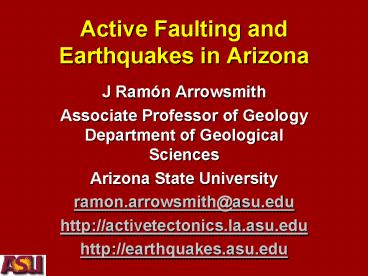Active Faulting and Earthquakes in Arizona - PowerPoint PPT Presentation
1 / 35
Title:
Active Faulting and Earthquakes in Arizona
Description:
Active Faulting and Earthquakes in Arizona – PowerPoint PPT presentation
Number of Views:91
Avg rating:5.0/5.0
Title: Active Faulting and Earthquakes in Arizona
1
Active Faulting and Earthquakes in Arizona
- J Ramón Arrowsmith
- Associate Professor of Geology Department of
Geological Sciences - Arizona State University
- ramon.arrowsmith_at_asu.edu
- http//activetectonics.la.asu.edu
- http//earthquakes.asu.edu
2
outline
- Overview of western US plate boundaries
- Arizona faults and seismicity
- Notable historic Arizona seismicity
- 2 important areas Western Grand Canyon and
Flagstaff - Summary
Acknowledgements
- Phil Pearthree, Chris Menges, David Brumbaugh
- Arizona Geological Society
- US National Science Foundation grants ITR/IMAP
(GEO) Collaborative research Creation of a
geospatial data system for the transition between
the Colorado Plateau and the Basin and Range
Provinces (Geoinformatics in Action)--EAR-0112960
and ITR Collaborative research GEON a research
project to create cyberinfrastructure for the
geosciences--EAR-0225543.
3
Plate Tectonic history of Western North America,
38 Ma to present sets configuration for ongoing
deformation
--From Tanya Atwater http//emvc.geol.ucsb.edu/
4
Arizona is not on the plate boundary
5
Quaternary faults from USGS (http//qfaults.cr.usg
s.gov/)
6
Seismicity gtM4 since 1900 (ANSS/CNSS Worldwide
Earthquake Catalog)
7
Crustal motion relative to Stable North America
(http//epicenter.usc.edu/cmm3/)
Largest velocity 49 mm/yr
8
Arizona is surrounded by relatively more rapidly
deforming crust
9
(No Transcript)
10
Q or QT units and Q faults
11
(No Transcript)
12
(No Transcript)
13
Important historic Arizona Earthquakes
http//www.azgs.state.az.us/Spring2000.htm
14
Historic earthquakes near Flagstaff (Intensity
gtVII) Jan. 25, 1906 great rocking motion
September, 1910 Numerous shocks, severe north
of San Francisco Peaks August 18, 1912
1910
1906
1912
--AEIC
15
1887 Pitaycachi, Sonora earthquake, M7.4 great
destruction near epicenter
the walls of the saloon did a two-step and the
floor did a shimmeynear Sierra Vista AZ
(McGarvin, 1987)
16
1887 Pitaycachi, Sonora earthquake
http//nisee.berkeley.edu/elibrary/index.html
(Steinbrugge Collection)
17
1887 Pitaycachi, Sonora earthquake scarp Late
Pleistocene paleoevent (?)
http//nisee.berkeley.edu/elibrary/index.html
(Steinbrugge Collection)
18
(No Transcript)
19
(No Transcript)
20
View North along Hurricane Fault near Cottonwood
Creek
21
Moriah Knoll Basalt New 40Ar/39Ar date of
0.850.06 Ma 154-204 m offset (paleoslope or
no) Approximately 0.15 to 0.25 mm/yr offset rate
22
- Morphologic dating of fault scarps along the
Hurricane Fault zone, Shivwitz segment - Assume that sediment flux is proportional to
local slope, no flow in or out of plane of
profile. Find best fit model profile. - Sed. Flux rate constant is k (1.1 m2/ky)depends
on climate, scarp material and aspect) - kt controls final form
- -gt 0.060.21 mm/yr offset rate for 6-80 ka
Diffusion erosion
23
Paleoseismic trench investigation
24
Paleoseismic trench investigation
25
Most Recent Earthquake colluvial wedge (2.3-3.4 m
offset at about 8900-10,400 calBPminimum age)
Penultimate Earthquake colluvial wedge (1.2-2.3 m
offset)
26
- Most Recent Event 2.3-3.4 m offset (M7-7.2)
8900-10,400 calBP - 10 kyr recurrence interval
- Steady deformation over Quaternary
27
Flagstaff area from the south
28
Lake Mary Fault and Flagstaff earthquake hazards
(with D. Brumbaugh, NAU)
29
Walnut Canyon
30
Observatory Road site
31
COARSE Collaboration
Matt Fouch, ASU Hersh Gilbert, UAGeorge Zandt,
UASusan Beck, UAEd Garnero, ASU
- Constrain first-order crust and upper mantle
structure - Provide regional images for focused EarthScope
effort
32
Q or QT units and Q faults
Arizona Seismicity Relatively low rate, long
recurrence, edge of Basin and Range Distributed
in Southern Colorado Plateau, possibly driven by
topographic/crustal thickness gradient Watch out
for an event in Southern California!
33
Complete Bouger Anomalyproxy for crustal
thickness (Yoburn, et al., in press)
Arizona Seismicity Relatively low rate, long
recurrence Distributed in Southern Colorado
Plateau, possibly driven by topographic/crustal
thickness gradient Watch out for an event in
Southern California!
34
Peak ground acceleration (g) with 2 probability
of exceedence in next 50 yrs (USGS)
http//earthquake.usgs.gov/hazmaps/products_data/
Arizona Seismicity Relatively low rate, long
recurrence Distributed in Southern Colorado
Plateau, possibly driven by topographic/crustal
thickness gradient Watch out for an event in
Southern California!
35
Interested in more information?
- M-34-Earthquake Hazards Map, by P.A. Pearthree
and D.B. Bausch, 1999, scale 11,000,000. 6.00 - http//www.azgs.state.az.us






























